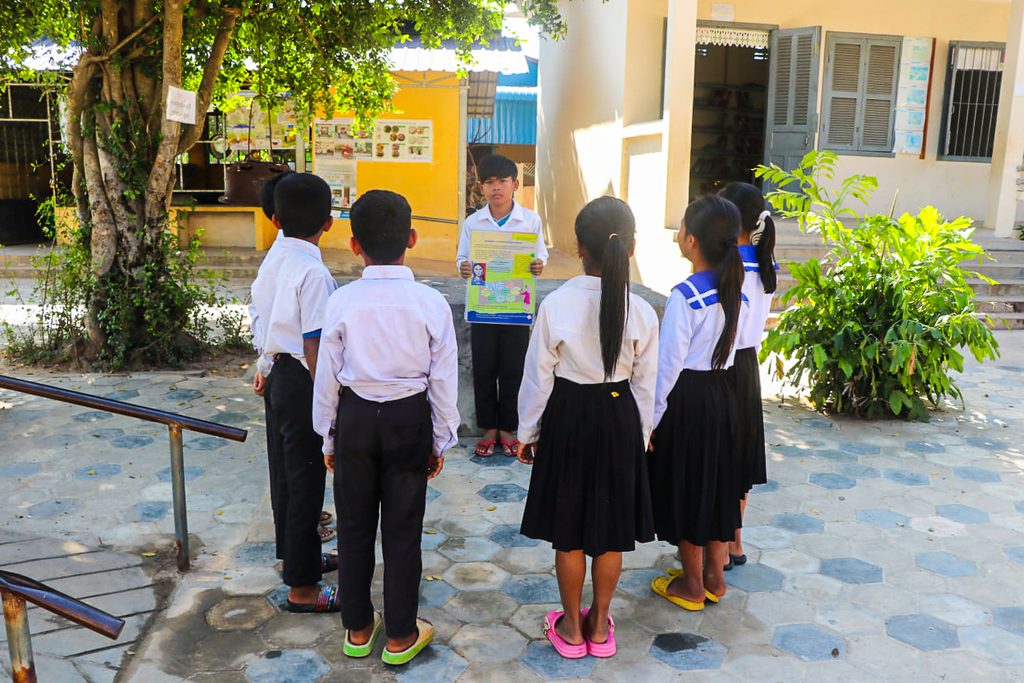A disaster resilient future for the next generation
Sokha and the other students at his school have been learning about how to keep their school safe and how to prepare and respond in a disaster. They are using this knowledge to adapt to climate change and keep each other safe.
Empowering a new generation
Sokha and the other students at his school participated in training activities that included school safety concepts, simulation exercises, first aid, climate change adaptation, and the roles and responsibilities of the children’s council.
“My friends are aware of what school safety means and are prepared for potential disasters,” says 12-year-old Sokha, a student leader at a primary school in Siem Reap province that is part of a safe schools project that aims to empower a new generation of climate-smart, disaster-resilient citizens.
This support and guidance has helped Sokha develop confidence in his communication and teamwork skills, enabling him to better participate in school and community events. “I also promote good sanitation and hygiene practices, help maintain a clean school environment and work in the school vegetable garden,” he adds.

The challenges have been faced
Explaining the challenges his school faced before the safe schools project, Sokha says: “There were no warning signs or basic safety features such as signs at the school entrance or fences around water areas. The environment was dirty and we had regular outbreaks of dengue fever.”
The school did not have a disaster management committee or disaster preparedness and response plans. It also lacked evacuation maps, instructions, guidance on school safety and necessary safety equipment.
“Like other students, I didn’t know what to do or who to contact in the event of a disaster,” recalls Sokha. “I also didn’t know anything about climate change, the roles and responsibilities of the student council, or children’s rights.”
Adapting changes in school and community
“My school is now clean and we’ve learned about climate change and disaster risk reduction,” says Sokha. “My classmates and I are equipped with the knowledge to adapt to the changing climate in our community.”
“My school is now clean and we’ve learned about climate change and disaster risk reduction.”
Sokha
As a member of his school’s disaster management team, Sokha has helped develop safe school practices, including creating evacuation and disaster maps and conducting safety drills to prepare students for potential disasters such as floods, droughts and storms.

“During this dry season, with temperatures exceeding 40 degrees Celsius, the school stocked up on water and advised students on health precautions during the day, allowing us to continue our studies,” says Sokha.
Satisfied with his school’s commitment to providing a safe and supportive learning environment for all students, Sokha says he is committed to expanding and sharing his knowledge with his peers and other members of the community. “I want to be a teacher and share my knowledge with the next generation,” he says with a smile.
About the project
In 2022, with funding from the Prudence Foundation through Prudential Cambodia, Plan International and our local partner Child Rights Foundation implemented the Safe Schools programme at Sokha’s primary school and 17 other primary schools in Siem Reap province.
The project aims to increase understanding of climate change, disaster risk management, safe school practices and child protection among students, teachers, student councils and school management committees.
It also supports infrastructure improvements, including the construction of school fences, gardens, gates, safety posters and warning signs. Traffic signs have been installed to prevent accidents, and schools conduct regular rubbish collection and promote healthy habits such as washing hands, drinking clean water and eating nutritious food.
Categories: Emergencies, Youth empowerment


